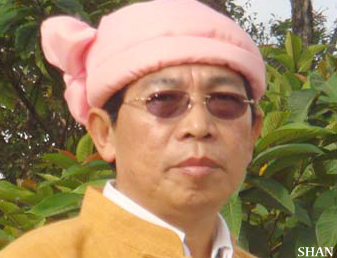Clearly as a signal that the group is still going along with the peace process, despite 14 clashes with the Burma Army during the past 3 months, Loi Taileng, the main base of the Shan State Army (SSA) South, last week issued a statement outlining its 6 point policy on the current ceasefire with Naypyitaw.
 The Restoration Council of Shan State / Shan State Army (RCSS/SSA), as the movement is formally known, in its statement that came out on 21 March in Shan, promises:
The Restoration Council of Shan State / Shan State Army (RCSS/SSA), as the movement is formally known, in its statement that came out on 21 March in Shan, promises:
- To help forge Shan State unity and help form a genuine Union
- To struggle for equal rights for each ethnic nationality
- To inform and cultivate the people of Shan State on the practice of parliamentary system as well as human rights
- To cooperate with the Thein Sein administration to eradicate drugs
- To stand firmly on the path of peace and to struggle on by political means until the goal is reached
- Not to resort to military means unless necessary
The full text of the unofficial translation can be read on SHAN website.
The statement however also affirms once again that “the issue, whether or not Shan State will remain in the Union, will be decided by the people of Shan State.”
The 1947 constitution had granted the right of secession to Karenni and Shan states. Article 204 provides for the President, upon receipt of notification by the state concerned of its wish to exercise the right, to order a plebiscite to ascertain the will of the people of the state concerned.
Sao Yawdserk, the SSA leader, says the policy’s first point “to help form a genuine Union” in no way in contradiction to the assertion that the decision whether or not to remain in the Union rests with the people of Shan State. “We cannot decide for them,” he said. “But we will respect their decision.”
The SSA delegation, meeting with its Naypyitaw counterpart on 17 December, had refused to sign the latter’s condition: Not to secede from the union at any time.
It later explained to SHAN the reason was two-fold:
- The process has yet to reach its third stage, political dialogue
- The decision should be taken by the people of the state as a whole than by one particular group
The agreement signed on 12 January accordingly did not mention any political issue.
The SSA is expected to meet the Naypyitaw negotiating team led by U Aung Min during the second half of April, after the annual water-throwing festival. One key issue to be discussed is on how both sides will cooperate on the fight against drugs. Burma’s 15 year master plan to eradicate drugs comes to an end in 2014.
Related report: SSA won’t sign non-secession agreement, SHAN, (20 December 2011)


